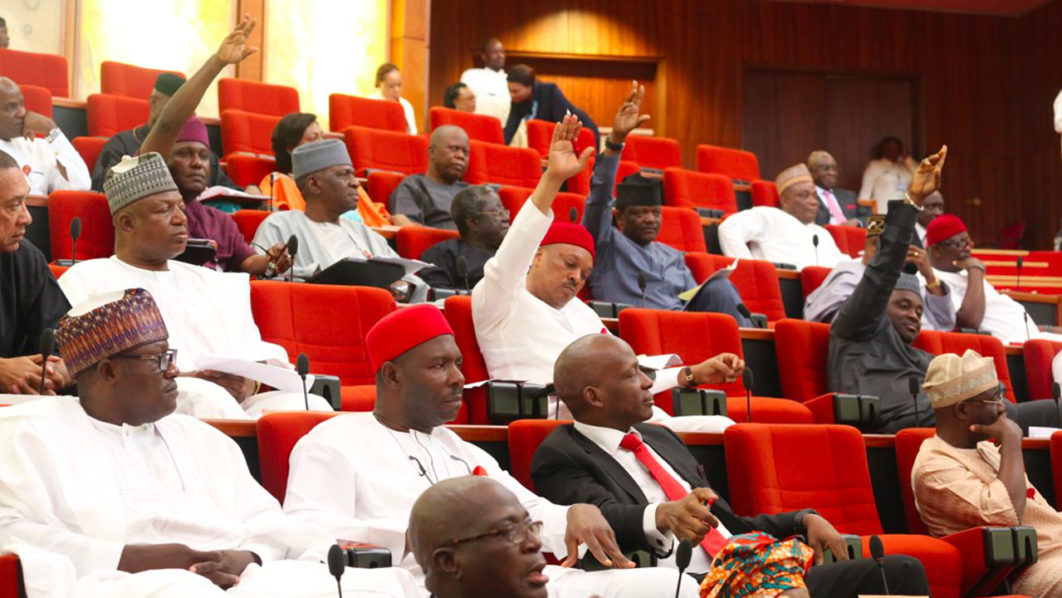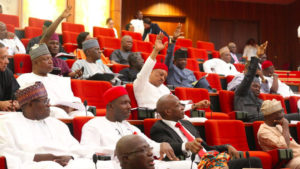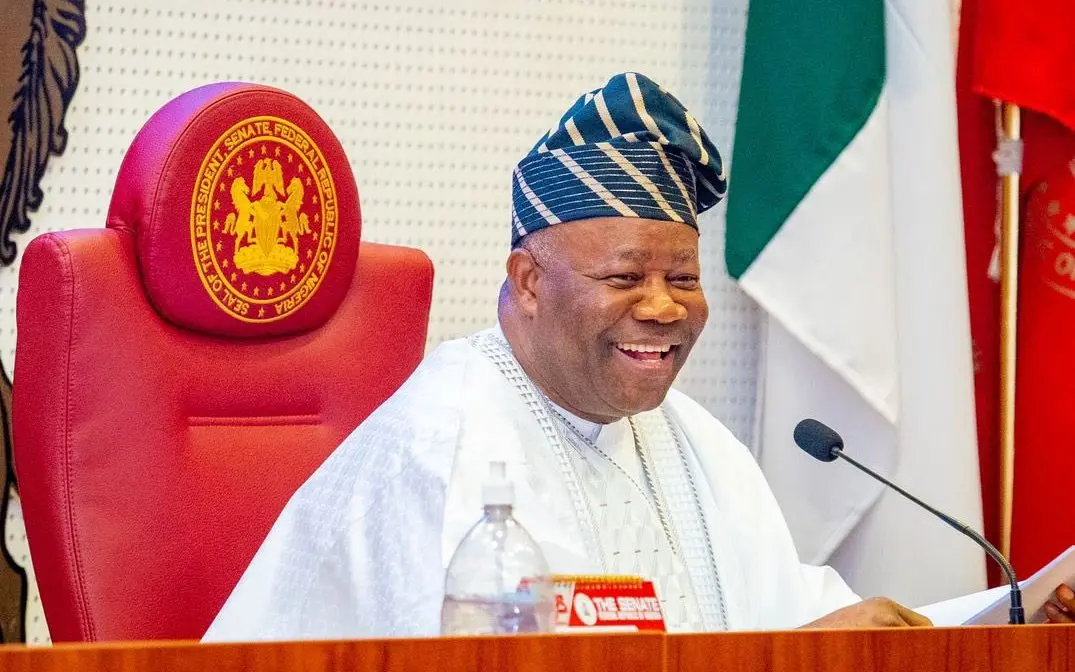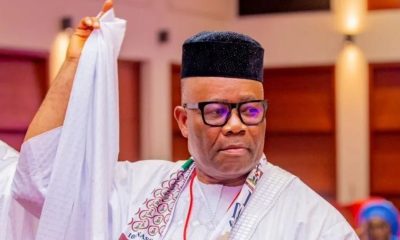General
Senate Cautions Fashola Over Comments on 2017 Budget


By Dipo Olowookere
Minister of Works, Housing and Power, Mr Babatunde Raji Fashola, has been warned by the Senate to “stop spreading wrong information and half-truth about the 2017 budget.”
A statement issued on Saturday by the Chairman, Senate Committee on Media and Public Affairs, Mr Aliyu Sabi Abdullahi, noted that the legislators worked to ensure equity across the country on all new and outstanding projects.
Mr Fashola was reported to have accused the upper legislative chamber of the National Assembly of cutting funds appropriated for critical infrastructural projects across the country and allocating such for boreholes and other as constituency projects by the Senators.
But in the statement by Mr Abdullahi, the Senate claimed the Minister did not give members of the public full details about the Lagos-Ibadan Expressway, which has been on a private finance initiative from the beginning because he would prefer an arrangement that allows the Ministry to continue to award contracts and fund the project through government budgetary allocation at a time when the nation’s revenue is dwindling and at an all-time low.
Mr Abdullahi stated that the Bureau of Public Procurement (BPP), and the Federal Executive Council (FEC) had in 2013, approved the reconstruction, rehabilitation and expansion of the Lagos-Ibadan expressway as a Public Private Partnership (PPP) project using the Private Finance Initiative, with the Federal Government providing about 30 percent of the funding while the balance shall be provided by the private sector.
The project was on course for completion by end of 2017 when the private finance initiative was being implemented, with over 30 percent completion rate attained as at early 2015.
Mr Abdullahi further noted that in a blatant disregard for existing agreements, constituted authorities and extant laws, Mr Fashola on assumption of office got government through the Ministry to start voting money for the implementation of the project.
“Even as at last year, the 2016 Appropriation Act voted N40 billion for the project on the insistence of the Ministry and only N26 billion was released. If we had known, the rest N14 billion could have been allocated to other critical roads across the country,” he said.
“In the spirit of consensus building and effective stakeholder engagement, the leadership of the Senate met with key relevant stakeholders, including the Ministries of Works and Finance. It was agreed that we should give the Private Finance Initiative a chance to complement government’s resources in the delivery of critical infrastructure assets across the country.
“Hence, in this year’s budget, we have engaged with the government and private sector groups who have assured that they will resume funding of the project.
“So, we only provided the fund in the budget that would ensure work does not stop before the funds from the private sector start coming in.
“What we reduced from Lagos-Ibadan Expressway in the 2017 budget estimate was spread on Oyo-Ogbomoso road in the South-west, Enugu-Onitsha road in the South-east, and two other critical roads in the North-east and North-west; and this was done to achieve equity.
“The Minister should realise he is Minister for the entire country and not just that of Lagos State.
“It is our view that the Federal Government cannot fund the reconstruction and maintenance of all the 34,000 kilometres of roads under its care.
“We are looking for private funds for some of these roads, particularly those with high potentials of attracting private investors.
“These include the Enugu-Onitsha road, Kano-Abuja road and Abuja-Lokoja road. It has been our hope that the Lagos -Ibadan road would be a model for private sector funding of infrastructure in the country,” the Senate’s spokesman stated.
He added that Mr Fashola knew that Federal Government cannot fully fund this road for completion by 2019 as he is promising Nigerians.
“It’s deceit of the highest order. Just going by the last two years of funding where an average of about N30b per annum was released then the nation would have to wait for the next six years for completion of the work.
“But with Private sector Finance Initiative, this project can be completed on time because full funding will be provided and there will be more certainty,” he stated.
Mr Abdullahi noted that since government did not have enough money and/or unlimited resources to provide all the needed road infrastructure on a sustainable basis, the use of funds from the private sector to complement government’s resources would ease pressure on the annual budgetary provisions for infrastructure provision, as more money will be spent on less commercially viable roads that would not ordinarily attract private sector investment as well as other social services like education, health and human capital development.
“The Minister’s statement is in bad taste and we believe he has been quoted out of context as an experienced public servant with over 15 years of high level responsibility will not be uttering such statements.
“He should desist from spreading half-truths. When he said the National Assembly imported projects into the 2017 budget, he did not mention that these include the 26 projects which the Federal Government approved in the 2016 budget, awarded contract for them in January 2016, but totally omitted them in the 2017 budget.
“One of them is the Abuja-Kaduna road. These ones would have become abandoned projects. We reduced funds across board to make provision for these omitted projects that are of critical importance to the socio-economic development of the country in line with equity and fair play.
“Mr Fashola obviously wants the Federal Ministry of Works to have many construction projects it can award contracts for and that is why he would always oppose any attempt to allow the private sector financing initiatives through Public Private Partnerships or other levels of government to fund construction of roads under the control of the Federal Government.
“That was why he waited until he was arm-twisted on the Lagos Airport road before he allowed the Lagos State government take up the reconstruction, using private funds.
“Same thing happened to the proposal for the Apapa Wharf road, which was frustrated for over a year before the stakeholders reined in the Ministry to grudgingly approve that Dangote and Flour Mills should take over the project.
“It should also be explained that nobody introduced budgetary provisions for the sinking of boreholes and construction of clinics under the budget of the Works division of the Ministry.
“However, the Housing division would ordinarily have provision for such facilities in its estimate, so as to meet the Sustainable Development Goals as provided for by the United Nations. This is aimed at reducing slums and improve the well-being of our citizenry.
“The National Assembly already have an agreement with the Acting President of the Federal Republic of Nigeria, Professor Yemi Osinbajo, that if for example, the Private Finance Initiative does not materialize to provide the needed funds for the completion of the Lagos-Ibadan Expressway, just as in other areas where government has issues with the budget, the instruments of Virement and supplementary budget can be used.
“This is as a result of our belief that it is one Government and we all share the gains of the successes and pains of the failure.
“However, with all these blackmail game and backbiting going on, they are already laying the foundation for the failure of the agreement with the Executive,” he stated.
Mr Abdullahi added that the National Assembly acted in the national interest to ensure equity and fairness is achieved in the distribution of projects and to ensure that all sections of the country have representation in the national budget as guaranteed by the Nigerian constitution.
General
Deep Blue Project: Mobereola Seeks Air Force Support

By Adedapo Adesanya
The Director General of the Nigerian Maritime Administration and Safety Agency (NIMASA), Mr Dayo Mobereola, is seeking enhanced cooperation between the agency and the Nigerian Air Force (NAF) with the aim of strengthening tactical air support within the Deep Blue project.
During a courtesy visit last week, Mr Mobereola told the Chief of Air Staff, Air Marshall S. K. Aneke at the NAF Headquarters in Abuja, that the Air Force was a strategic partner in enhancing maritime security in Nigeria and sustaining the momentum of the Deep Blue Project’s success.
According to the DG, “We are here to seek the Air Force’s support, given the importance of tactical air surveillance to the Deep Blue Project. Nigeria is the only African country with a record of zero piracy within the last 4 years. The Deep Blue Project platforms have been used to achieve zero piracy and sea robberies in the Gulf of Guinea, and we need your collaboration to sustain this momentum”.
He further emphasised that international trade depends on security, which is why vessels prefer to go to or transit through countries where they are secured. “With the traffic we have now, we need to show more security might through collaboration to strengthen our trade viability because of the risks attached to our route. We need these collaborations to sustain what we have achieved so far with the Deep Blue Project”.
The NIMASA DG expressed hope that the collaboration with the Nigeria Air Force will reduce response time.
On his part, the Chief of Air Staff, Air Marshall S.K. Aneke, noted that the Air Force desires to be “a very supportive and collaborative partner with NIMASA and is ready to match the Agency step by step and side by side to achieve the desired results.”
He noted that “collaboration between NIMASA and the Nigerian Air Force under the Deep Blue Project can be strengthened through a joint strategic framework, integrated command structures, and a standing steering committee to ensure shared objectives and accountability.
“Establishing a joint maritime domain awareness fusion cell will enable real-time intelligence sharing, synchronised surveillance, and faster response to maritime threats and ensure sustained operational effectiveness across Nigeria’s territorial waters and exclusive economic zone,” he said, according to a statement.
The Air Force Chief added that the Air Force can also support NIMASA outside the Deep Blue Project operations by providing its own ISR platforms, tactical air support, and rapid airborne deployment for interdictions and search and rescue missions.
While thanking the NIMASA DG for the basic trainings the Agency has provided the aircraft pilots under the Deep Blue Project, Air Marshall Aneke also highlighted areas of operational challenges needing NIMASA’s attention to include bridging the communication gap between NAF operators and NIMASA, higher level and in-depth maintenance trainings, readily available fueling of aircrafts to avoid delays on missions, and provision of flying kits among others.
He therefore pledged the Air Force’s collaboration and assured that the request by NIMASA has been noted and that things will begin to move at thrice its speed going forward.
General
Nigeria’s Democracy Suffocating Under Tinubu—Atiku

By Modupe Gbadeyanka
Former Vice President, Mr Atiku Abubakar, has lambasted the administration of President Bola Tinubu for the turnout at the FCT Area Council elections held last Saturday.
In a statement signed by his Media Office, the Adamawa-born politician claimed that the health of Nigeria’s democracy under the current administration was under threat.
According to him, “When citizens lose faith that their votes matter, democracy begins to die. What we are witnessing is not mere voter apathy. It is a direct consequence of an administration that governs with a chokehold on pluralism. Democracy in Nigeria is being suffocated slowly, steadily, and dangerously.”
He warned that the steady erosion of participatory governance, if left unchecked, could inflict irreversible damage on the democratic fabric painstakingly built over decades.
“A democracy without vibrant opposition, without free political competition, and without public confidence is democracy in name only. If this chokehold is not released, history will record this era as the period when our hard-won freedoms were traded for fear and conformity,” he stressed.
Mr Atiku said the turnout for the poll was below 20 per cent, with the Abuja Municipal Area Council (AMAC) recording 7.8 per cent.
He noted that such civic participation in the nation’s capital, the symbolic heartbeat of the federation, is not accidental, as it is the predictable outcome of a political environment poisoned by intolerance, intimidation, and the systematic weakening of opposition voices.
The presidential candidate of the People’s Democratic Party (PDP) in the 2023 general elections stated that the ruling All Progressives Congress (APC) under Mr Tinubu has pursued a deliberate policy of shrinking democratic space, harassing dissenters, coercing defectors, and fostering a climate where alternative political viewpoints are treated as threats rather than contributions to national development.
He called on opposition parties and democratic forces across the country to urgently close ranks and forge a united front, declaring, “This is no longer about party lines; it is about preserving the Republic. The time to stand together to rescue and rebuild Nigeria is now.”
General
Nigeria Eyes Full Entry into Council of Palm Oil Producing Countries

By Adedapo Adesanya
Nigeria is set to validate a technical committee report geared towards transitioning the country from observer status to full membership of the Council of Palm Oil Producing Countries (CPOPC) in April.
Mr Abubakar Kyari, Minister of Agriculture and Food Security, said this when the council’s mission visited him over the weekend in Abuja, noting that the ministry had constituted a technical committee to consider how the country would seamlessly transit from observer country to membership in CPOPC based on its strategic importance in palm oil production.
“We are conscious of the fact that the palm oil value chain is very strategic for us and identified it as an export crop that can drive foreign exchange for the country and ensure good health in terms of consumption.
“We are conscious of the fact that we need the support of CPOPC countries to provide the country with a new variety of seeds that are climate-smart and resistant so that they can be produced by farmers in the country,” he said.
Mr Alphonsus Inyang, President, National Palm Produce Association of Nigeria (NPPAN), said being a member of CPOPC Nigeria would target over 10 million tonnes of oil palm between 2026 and 2050.
“We are also targeting 2.5 million hectares from among Nigeria households who are out to produce one hectare each, geared towards a N20 trillion annual economy within this period from among Nigeria households.
“We are working side by side with the big players who will be developing plantations,” he said.
The Secretary-General of CPOPC, Ms Izzana Salleh, said the council’s mission to Nigeria was to see how the country could transit from observer status to full membership, among others
She said that the status of the country as an observer nation since 2024 would expire by November.
Ms Salleh assured the country of the council’s readiness to support its vision to strengthen domestic production, enhance food security and build a competitive and sustainable palm oil supply chain.
The official emphasised that being a member of the council would strategically position Nigeria for a greater future regarding oil palm production.
According to her, the visit is to strengthen the council’s engagement with Nigeria, including potential membership in CPOPC.
She said: “The council’s mission to Nigeria aims to advance both Nigeria’s national ambitions and Africa’s collective voice in global agricultural discussions.
“CPOPC was established to promote cooperation among producing nations, empower smallholders, advance sustainability, and ensure fair, science-based global dialogue on vegetable oils.
She emphasised that being a member of the council would strategically position the country for greater future prospects regarding oil palm production and the value chain, as well as export.
“We are ready to support Nigeria’s vision to strengthen domestic production, enhance food security, and build a competitive and sustainable palm oil supply chain,” she said.
-

 Feature/OPED6 years ago
Feature/OPED6 years agoDavos was Different this year
-
Travel/Tourism10 years ago
Lagos Seals Western Lodge Hotel In Ikorodu
-

 Showbiz3 years ago
Showbiz3 years agoEstranged Lover Releases Videos of Empress Njamah Bathing
-

 Banking8 years ago
Banking8 years agoSort Codes of GTBank Branches in Nigeria
-

 Economy3 years ago
Economy3 years agoSubsidy Removal: CNG at N130 Per Litre Cheaper Than Petrol—IPMAN
-

 Banking3 years ago
Banking3 years agoSort Codes of UBA Branches in Nigeria
-

 Banking3 years ago
Banking3 years agoFirst Bank Announces Planned Downtime
-

 Sports3 years ago
Sports3 years agoHighest Paid Nigerian Footballer – How Much Do Nigerian Footballers Earn






















